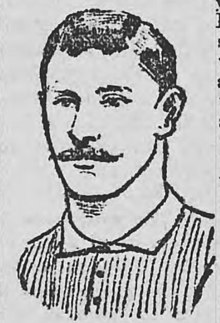Lawrence Bulger
 | |||||||||||||||||||||||||||||
| Birth name | Lawrence Quinlivan Bulger | ||||||||||||||||||||||||||||
|---|---|---|---|---|---|---|---|---|---|---|---|---|---|---|---|---|---|---|---|---|---|---|---|---|---|---|---|---|---|
| Date of birth | 5 February 1870 | ||||||||||||||||||||||||||||
| Place of birth | County Clare, Ireland | ||||||||||||||||||||||||||||
| Date of death | 17 March 1928 (aged 58) | ||||||||||||||||||||||||||||
| Place of death | Twickenham, England | ||||||||||||||||||||||||||||
| School | Blackrock College | ||||||||||||||||||||||||||||
| University | Trinity College Dublin | ||||||||||||||||||||||||||||
| Rugby union career | |||||||||||||||||||||||||||||
| |||||||||||||||||||||||||||||
Lawrence 'Larry' Quinlivan Bulger (5 February 1870 – 17 March 1928)
Early life
Lawrence Bulger was born in County Clare in 1870.[3] The Bulger family lived in Moore Street, Kilrush, where his father, Daniel Scanlan Bulger, was a woollen merchant and draper and ran a loan office.[4] His mother Anne, née Delany, was from Limerick.[5] Later the Bulgers moved to Dublin, where Daniel was a stockbroker and city councillor. Lawrence and his brother Michael were educated at Blackrock College.[6]
Personal life
Both of Lawrence's older brothers,
Rugby career
Blackrock
Lawrence Bulger was a member of the Blackrock College side which won the first Leinster Schools Cup in 1887.[10]
Ireland
After Bulger left Blackrock, he gained entry to Trinity College Dublin where he studied medicine. While at Trinity he represented Dublin University Football Club and showed a flair for athletics. He served as treasurer and secretary for the Dublin Hospitals Rugby Cup 1890–1897. He led Richmond Hospital to their first victory in the 1896 Cup, scoring the winning try. He organised the first game against the London United Hospitals in 1894.[11] Bulger was first chosen to represent Ireland while still playing for Dublin University, when he was selected to face
After his Irish career came to an end, Bulger continued playing rugby in England. He set up a medical practice in London with his brother Michael, and Michael became a founding member of the exiles team London Irish.[7] Both brothers turned out regularly for the club.
British Isles XV
In 1896, while still a student, Bulger was selected to tour with
Notes
- ^ Lawrence Bulger player profile ESPNScrum.com
- ^ a b Godwin (1984), pg 48.
- ^ ""Ireland, Births and Baptisms, 1620–1881," Laurence Bulger, 1870". FamilySearch. Retrieved 27 May 2012.
- ^ Bassett's Directory 1880-1.
- ^ 1901 census
- ^ "Students of Blackrock College who have been awarded International Caps". Blackrock College. Retrieved 27 May 2012.
- ^ a b c Cyril M. White. "University Athletics in Ireland 1857–2000". athleticsireland. Archived from the original on 17 March 2013. Retrieved 3 September 2015.
- ^ Seán Diffley (14 July 2007). "Tailteann Games' place in history going for a song". Retrieved 5 March 2009.
- ^ The Times, Tuesday, 20 March 1928; p. 7; Issue 44846; col C.
- ^ Seán Diffley (21 January 2002). "Cupid's arrow starts love-in". Retrieved 26 November 2011.
- ^ Dr Morgan Crowe (14 October 2019). The Hospital Pass: 140 years of Dublin Hospitals Rugby (YouTube video). Dublin, Ireland: Royal College of Physicians in Ireland.
- ^ Godwin (1984), p. 47.
- ^ Griffiths (1987), p. 3:9.
- ^ Godwin (1984), pg 50.
- ^ Lansdowne Football Club Hall of Fame
- ^ See team photograph.
- ^ Lawrence Bulger player profile Lionsrugby.com
References
- Godwin, Terry (1984). The International Rugby Championship 1883–1983. London: Willows Books. ISBN 0-00-218060-X.
- Griffiths, John (1987). The Phoenix Book of International Rugby Records. London: Phoenix House. ISBN 0-460-07003-7.
